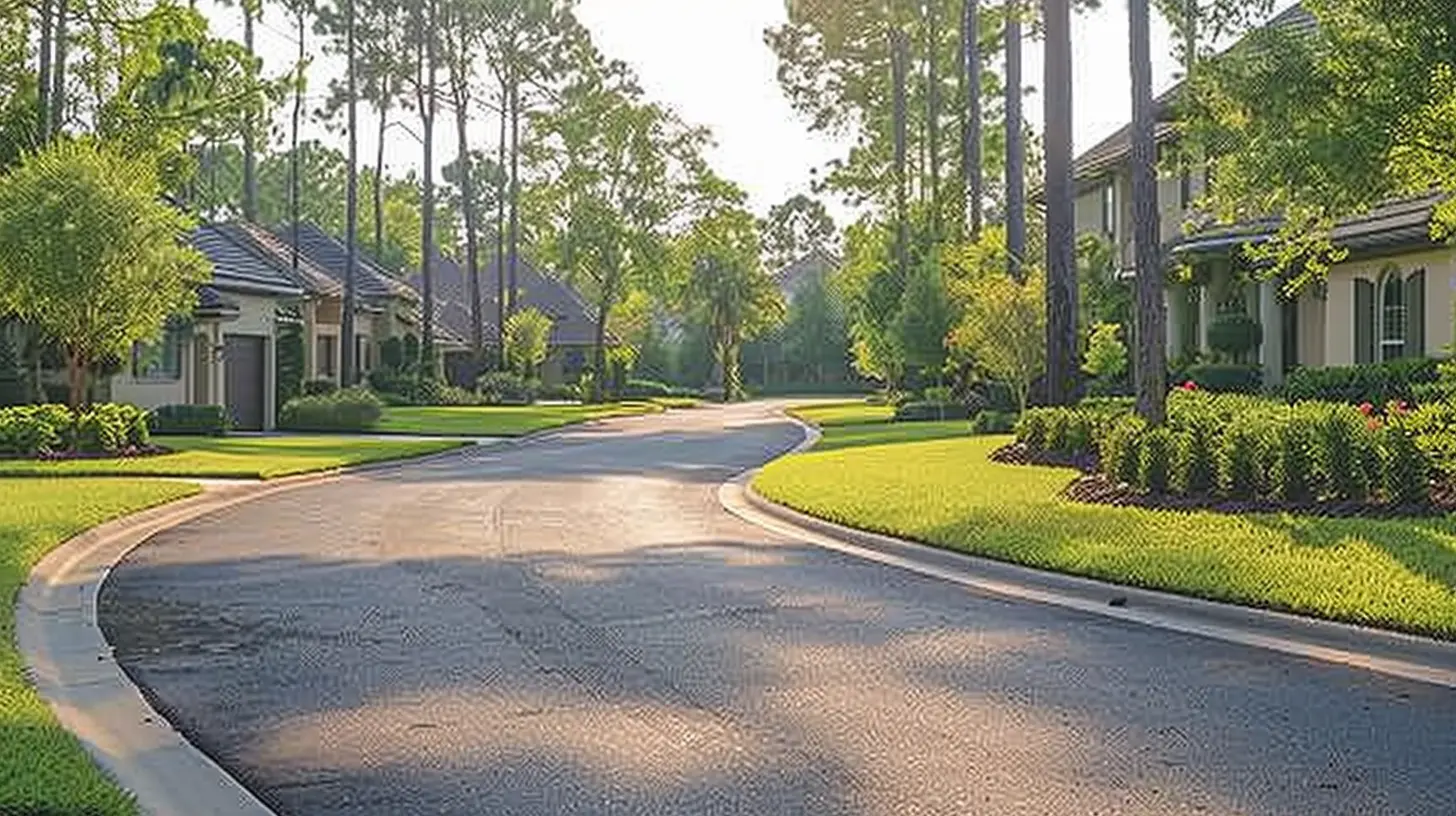Legal Implications of Buying Property in an HOA Community
15 January 2025
If you're considering buying property in a homeowners association (HOA) community, you're not alone. HOAs are everywhere these days, and they offer a lot of perks: tidy landscapes, shared amenities like pools and tennis courts, and even a sense of community. But let’s get real for a second—there’s more to HOAs than new neighbors and freshly mowed lawns. Buying property in an HOA-governed area comes with its own set of legal implications. And these implications? They can make or break your buying decision.
Let’s dive in and unpack the legal side of living in an HOA community—because no one likes a surprise lawsuit or hefty fine, right?
What Exactly Is an HOA?
Before we start talking about legal stuff, let’s make sure we’re on the same page about what an HOA actually is. Think of an HOA as a neighborhood watchdog (but without the barking). It’s a private organization established by developers to manage and maintain the community.When you buy property in an HOA-governed community, you automatically become a member, and with that membership comes responsibilities—financial and otherwise. These responsibilities are the fine print that many buyers skim over, but trust me, understanding them is critical. 
Legal Implications You Must Know
1. HOA Governing Documents Are Legally Binding
When you purchase property in an HOA, you’re signing up for a legally binding relationship with the association. HOAs have three main governing documents you need to be aware of:- CC&Rs (Covenants, Conditions, and Restrictions): Think of this as the HOA’s rulebook. It outlines what you can and cannot do with your property (e.g., no painting your house neon green or owning exotic pets like a tiger).
- Bylaws: These govern the internal workings of the HOA, such as how meetings are conducted and how decisions are made.
- Rules and Regulations: This is more like an add-on to the CC&Rs. It covers the nitty-gritty details, from parking restrictions to noise policies.
Pro tip: These documents aren’t just suggestions—they’re enforceable. Breaking the rules? You could face fines, penalties, or even legal action.
2. You’re Obligated to Pay HOA Fees
Yup, HOA membership comes with dues—monthly, quarterly, or annually. These fees fund community maintenance (think mowing, snow removal, and fixing the communal pool’s broken filters).The legal twist? Nonpayment can have serious consequences. HOAs have the power to:
- Place a lien on your property (basically a legal claim that needs to be paid off before you can sell).
- Take you to court.
- In some states, foreclose on your property.
So, if you’re the kind of person who tends to “forget” bills, an HOA might not be your best fit.
3. You May Be Subject to Architectural Control
Got big renovation dreams? In an HOA community, you can’t just build a second-story balcony or install a backyard pool on a whim. Most HOAs have an architectural review board that must approve any alterations to your property.What’s the legal implication here? If you skip the approval process or break the rules, the HOA can demand you undo the work—even if it costs you thousands of dollars.
4. HOAs Can Enforce Compliance Through Fines and Legal Action
Think of an HOA as a mini government. They have enforcement teeth, meaning they can fine you, suspend your right to use amenities, or even sue you for breaking the rules.For instance, let’s say your grass gets a little wild, and the HOA sends you a letter asking you to trim it. Ignore that letter, and you might find yourself dealing with a fine—or worse, a lawsuit.
5. HOAs Can Restrict Rentals and Short-Term Leases
Planning to rent out your property or list it on Airbnb? Not so fast. Many HOAs have strict rules about renting, especially short-term leases.Some HOAs outright ban Airbnb-style rentals, while others limit the number of rental units in the community. And yes, these restrictions are 100% enforceable in court.
6. Conflict Resolution Can Get Tricky
Disputes with HOAs happen. Maybe you think you’re being unfairly fined, or maybe you feel the HOA is misusing funds. While you can always take legal action, many HOAs require disputes to go through mediation or arbitration first.Essentially, this means you might not get your day in court immediately. It’s a slower, more bureaucratic process, but it’s often a requirement baked into the HOA’s governing documents.
7. HOAs Have the Power to Amend Rules
Here’s a curveball: HOAs don’t stay static. Over time, they can amend the CC&Rs and other governing documents. That means the rules you agreed to when you bought your property aren’t necessarily set in stone.Now, amendments typically require a vote by the community or board, but the changes can still legally bind you. For example, your HOA might suddenly decide to outlaw backyard trampolines or implement higher fees. 
Questions To Ask Before Buying in an HOA
Alright, so you’re thinking about buying in an HOA. What now? To avoid nasty surprises, here are a few key questions you should ask:- What are the current HOA fees, and do they have a history of increasing?
- Can I review the CC&Rs, bylaws, and rules before buying?
- Are there any ongoing disputes or lawsuits involving the HOA?
- What’s the HOA’s financial status? (Hint: You’ll want to ensure they have a healthy reserve fund.)
- Are there restrictions on pets, vehicles, or renters?
Getting these answers upfront is like reading a recipe before you start cooking—it’s going to save you a lot of headaches later. 
Pros and Cons of HOA Living
Still on the fence? Let’s summarize the pros and cons of HOA communities.The Pros:
- Cleaner neighborhoods with well-maintained amenities.- Increased property values due to consistent standards.
- A more organized and structured way of living.
The Cons:
- Less freedom to do what you want with your property.- Potential for legal trouble if you break the rules.
- Mandatory fees that can grow over time.
It boils down to this: If you’re okay with structure and rules, an HOA might be right for you. If you value freedom above all else, you might want to steer clear.
The Final Word
Buying property in an HOA-governed community is a big decision, and the legal implications can’t—and shouldn’t—be ignored. From binding documents to enforceable rules, living in an HOA means playing by the book.But hey, it’s not all bad news. For some, the benefits (hello, sparkling clean pool!) outweigh the limitations. For others, the restrictions feel like living under a magnifying glass.
The trick? Do your homework. Read the governing documents, ask the right questions, and make sure you’re fully aware of what you’re signing up for before you fall in love with that pretty house on the corner.
all images in this post were generated using AI tools
Category:
Real Estate LawsAuthor:

Camila King
Discussion
rate this article
14 comments
Layla Allen
This article highlights crucial legal considerations for buying property in an HOA community. Understanding the governing documents, fees, and restrictions is vital to avoid surprises. Buyers must thoroughly review these aspects to ensure their expectations align with the community's regulations and policies.
April 6, 2025 at 10:23 AM

Camila King
Thank you for your insightful comment! Understanding HOA regulations and documents is indeed essential for a smooth buying experience.
Selah Mendoza
Navigating the legal intricacies of buying property in an HOA community can be daunting, but knowledge is your best ally! Embrace this challenge as an opportunity to empower yourself. With the right information, you can confidently invest in your future and enjoy the benefits of community living!
February 1, 2025 at 9:25 PM

Camila King
Thank you for your insightful comment! Knowledge truly is key when navigating HOA legalities. Empowerment through information is essential for a successful investment in community living.
Runevale Rios
Understanding the legal implications of buying in an HOA is crucial. Homeowners must be aware of the rules, fees, and potential restrictions that could impact their property rights and lifestyle. Knowledge empowers wise decision-making.
January 26, 2025 at 1:08 PM

Camila King
Absolutely! Being informed about HOA rules and fees is essential for making sound property decisions and protecting your rights as a homeowner.
Rosalie Jimenez
Buying in an HOA? Buckle up! You're trading freedom for rules—get ready to read the fine print and embrace the quirks of community living!
January 23, 2025 at 4:21 AM

Camila King
Absolutely! While HOA living offers amenities and a sense of community, it's essential to fully understand the rules and regulations to ensure a smooth experience.
Winona Dodson
Buying in an HOA? Consider it a ticket to a rollercoaster ride of rules and regulations! Just remember, those bylaws are like the fine print of a thrilling novel—exciting, but best to read before diving into the adventure of homeownership!
January 22, 2025 at 12:33 PM

Camila King
Absolutely! Understanding HOA bylaws is crucial—like reading the fine print before an adventure. It equips homeowners to navigate the rules and ensures a smoother experience in community living.
Tabitha McQuillen
This article offers valuable insights into the legal aspects of purchasing property in an HOA community. Understanding the rules and regulations can prevent future conflicts and promote smooth transactions. It's essential to review HOA documents carefully and consult legal advice when needed. Great job!
January 22, 2025 at 5:49 AM

Camila King
Thank you for your kind words! I'm glad you found the insights valuable. Understanding HOA regulations is indeed crucial for a smooth property transaction.
Avianna Rhodes
Understanding the legal implications of buying property in an HOA is crucial; it involves adhering to community rules, potential fees, and implications for property value and resale.
January 21, 2025 at 10:07 PM

Camila King
Thank you for your insightful comment! You're absolutely right; understanding HOA rules and fees is essential for ensuring a smooth property purchase and maintaining property value.
Zedric McCartney
When purchasing property in an HOA community, it's crucial to understand the legal implications, including adherence to community rules, potential fines for violations, and the impact on property value. Consulting with a real estate attorney can provide valuable guidance.
January 20, 2025 at 2:07 PM

Camila King
Thank you for your insightful comment! Understanding the legal aspects of HOA communities is essential for buyers. Consulting a real estate attorney can indeed help navigate these complexities effectively.
Davina McMillen
Understanding HOA regulations is crucial when buying property. Ensure you review covenants, conditions, and restrictions thoroughly to avoid potential legal issues and disputes in the future.
January 20, 2025 at 3:43 AM

Camila King
Absolutely, understanding HOA regulations is key to a smooth ownership experience and helps prevent future disputes. Always review CC&Rs carefully before purchasing.
Karly Barrett
This article provides valuable insights into the legal aspects of purchasing property in an HOA community. It's crucial for buyers to understand HOA rules and potential conflicts, as well as their rights and obligations. Consulting with a real estate attorney can further ensure a smooth transaction. Great resource!
January 19, 2025 at 9:16 PM

Camila King
Thank you for your thoughtful comment! I'm glad you found the article helpful in navigating the legal aspects of purchasing in an HOA community.
Cerys Carey
Great insights on the legal nuances of purchasing in an HOA community! It's crucial for potential buyers to understand the rules and regulations. This article is a must-read for anyone considering a move to an HOA neighborhood!
January 18, 2025 at 11:39 AM

Camila King
Thank you for your thoughtful feedback! I'm glad you found the insights helpful for potential buyers.
Ember McGehee
This article provides a concise overview of the legal implications of purchasing property in an HOA community. It highlights important considerations such as association rules, potential fees, and enforcement measures. Buyers should weigh the benefits of community amenities against the governance and restrictions that come with HOA ownership.
January 18, 2025 at 5:55 AM

Camila King
Thank you for your insightful summary! I'm glad the article emphasized the key considerations for potential buyers in HOA communities.
Rune McGinnis
Great article! Navigating the legal aspects of HOA communities can be tricky. Your insights offer valuable guidance for prospective buyers. Thanks for shedding light on this important topic!
January 17, 2025 at 4:45 AM

Camila King
Thank you for your kind words! I'm glad you found the article helpful. Understanding HOA legalities is crucial for buyers.
Duke Hill
This article beautifully highlights the often-overlooked legal nuances of purchasing in an HOA community. Understanding these implications is crucial for making informed decisions. Thank you for shedding light on such an important topic that can significantly impact homeowners' experiences and investments. Your insights are invaluable for anyone considering this journey.
January 16, 2025 at 5:41 AM

Camila King
Thank you for your thoughtful comment! I’m glad you found the article helpful in navigating the complexities of HOA purchases. Your engagement is much appreciated!
MORE POSTS

The Hidden Impact of Tourism on Local Property Markets

Trending Amenities Renters Are Seeking in Multifamily Buildings

How to Review a Real Estate Contract Like a Pro

How Financing Contingencies Impact Real Estate Contracts

Tips for Buying a Home in a Seller’s Market

The Benefits of Energy-Efficient Affordable Housing Developments

Important Factors to Consider When Buying Your Second Home

Environmental Regulations and Real Estate Development

Budget-Friendly Ways to Renovate Your Home Without Compromising Style